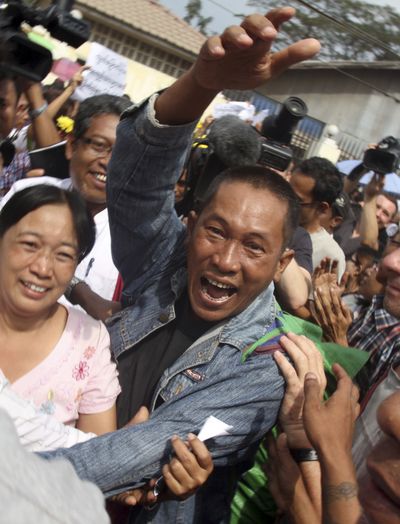U.S. restores diplomatic relations with Myanmar
Move follows release of political prisoners

WASHINGTON – The Obama administration restored full diplomatic relations with Myanmar, moving swiftly to reward the military-backed government for reforms including a cease-fire with ethnic insurgents and the release of political prisoners.
The move Friday came only six weeks after Secretary of State Hillary Rodham Clinton made a historic visit that highlighted Washington’s attempts to re-engage with a strategic Asian nation that remains under strict sanctions for its dismal human rights record.
The White House was eager for rapprochement, in part, to pull the resource-rich country out of China’s political and economic orbit. Clinton flew to the capital of Naypyidaw shortly after President Barack Obama announced a “pivot” in U.S. military and diplomatic policy to reassure allies in the Asia-Pacific region who are nervous about China’s increasing assertiveness.
Diplomatic relations were kept to a minimal level over the last two decades, but never severed. The administration now will send an ambassador to Myanmar for the first time since 1990, and invited the government to send an envoy to Washington.
On Friday, Obama hailed Myanmar’s progress on several fronts, especially the announced release of 651 prisoners. Although U.S. officials could not confirm the total, or the identities of those released, they said it included some pro-democracy leaders who had languished in prison since authorities in Myanmar, which also is known as Burma, crushed peaceful anti-government protests in 1988.
In a statement, Obama called Friday’s release “a substantial step forward for democratic reform.”
“Much more remains to be done to meet the aspirations of the Burmese people,” Obama added, “but the United States is committed to continuing our engagement with the government.”
U.S. officials also hailed the government’s cease-fire with the ethnic Karen minority, saying it may open the way to ending one of the world’s longest-running insurgencies. The Karens have fought the central government for autonomy since the country won independence from Great Britain after World War II.
Clinton described the reforms as “historic and promising,” and said Washington will “meet action with action.” But she said full normalization of relations, including steps to unravel the web of sanctions, would take time.
Since late 2010, Myanmar has held an election, released pro-democracy leader Aung San Suu Kyi from detention and recognized her previously banned opposition National League for Democracy Party. It also legalized labor unions, and suspended construction of a controversial China-backed dam.